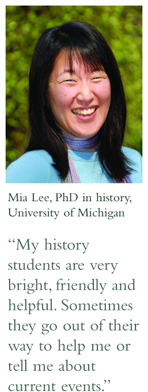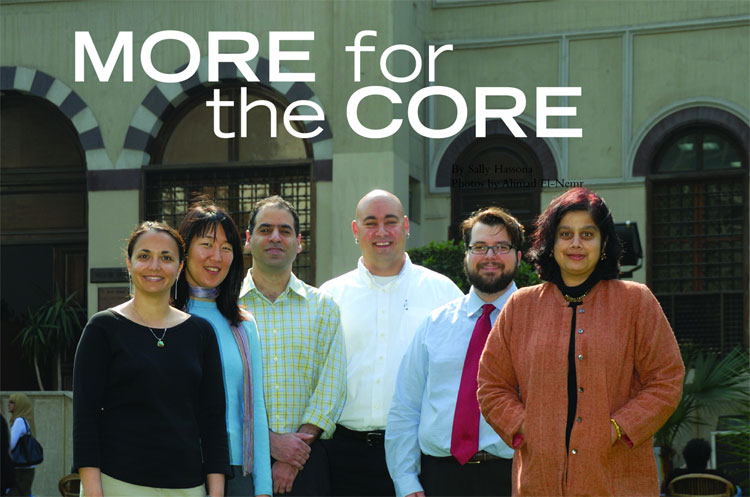 Postdoctoral fellows are being recruited from top universities around the world to teach the Core Curriculum
Postdoctoral fellows are being recruited from top universities around the world to teach the Core Curriculum
“I want my students to understand rather than just memorize, to learn things like the decision-making process, how to measure things and the uncertainty of results. At the end of the day, I am trying to create critical thinkers,” said Tiffany Vora, a postdoctoral fellow from Princeton University who is teaching the Scientific Thinking course at AUC.
Vora is part of a group of six postdoctoral fellows who have been recruited to teach Core Curriculum courses. As part of its commitment to liberal arts education, the university has recently restructured the Core Curriculum, revamping its courses and bringing in postdoctoral fellows from top universities around the world to teach them.
The fellows are recruited for three years, after which a new group will be selected. Having just completed their doctoral studies from prominent universities, including Princeton and Yale, these fellows offer fresh insight into the core program.
“Having young scholars who recently acquired their PhDs teach the core courses creates a mutual benefit to the professors and students,” said John Swanson, associate provost and director of the Core Curriculum. “Not only will these new professors acquire teaching experience, they will also become familiar with the Arab world and the Middle East region as a whole. For the students, they will have full-time professors who are close to them in age, which will facilitate discussion and understanding on both sides. This proximity in age will also enable the teaching fellows to understand the types of problems students are having with course material and explain it to them in a way that they can relate to.”
This year, 200 applicants applied for six postdoctoral teaching slots. The selected professors, Swanson explained, come from different universities around the world and have varying research interests, which enhances the quality of education they can offer to students.
Vora, who holds a PhD in molecular biology brings innovative teaching methods to her students. “I can see that most of my students come from schools that rely on memorization, and I want to change that,” she said.
Vora decided to join AUC because she felt that coming to this part of the world would help develop her teaching skills and promote her enthusiasm for science. “I want to experience the real interaction between the United States and the Middle East and discover a broader global perspective as a scientist,” she said.
Sharing the same excitement about being in Egypt and at AUC, Mia Lee, who has a PhD in history from the University of Michigan, is teaching a new core course in modern history. “I actually applied to study at AUC as an undergraduate, but my parents were against me leaving to another country at the time. So it’s nice to be able to finally come here,” she said.
 A specialist in modern German history, Lee has already begun to form a bond with her students. “My history students are very bright, friendly and helpful,” she said. “Sometimes they go out of their way to help me out or tell me about current events.”
A specialist in modern German history, Lee has already begun to form a bond with her students. “My history students are very bright, friendly and helpful,” she said. “Sometimes they go out of their way to help me out or tell me about current events.”
Lee added that teaching at AUC is a great opportunity for her and her students to exchange knowledge and experiences. “Being here will help with my research on modern Germany because of Egypt’s proximate location to Europe,” Lee noted. “Students will also discover history from a new perspective. I can see how positive they all are from the portfolios they submit about the subject.”
Like Vora and Lee, many of the postdoctoral fellows appreciate the opportunity to be in a culture different from their own. “I learn a new word everyday, and I’m understanding the pattern of Egyptian society,” said Sean McMahon, who holds a PhD in international relations and international political economy from the University of Alberta in Canada. “My PhD supervisor recommended visiting AUC. I was very interested to come here, and so far it is the best personal and professional decision I’ve ever taken.”
Teaching an introductory political science course, McMahon also brings new ideas and approaches to his classes. “I like to integrate technology into my teaching,” he explained. “Whenever relevant, I use a PowerPoint presentation that relates to the topic. I want students to feel that the idea is not just merely academic.”
McMahon also encourages a vibrant discussion in class. “I have 25 students who exchange their ideas and opinions freely in seminar-type peer sessions. Ultimately, you have to identify whether you want to teach or just deliver standard pedagogy.
For Neeraja Sankaran, who completed her PhD in the history of medicine and science from Yale University, coming to AUC was a perfect fit. “When I read the job announcement,” she said, “the description of the position, especially the Core Curriculum and the Scientific Thinking course, jumped out at me immediately as an ideal match for someone with my background and aspirations. The fact that it was in Egypt brought me back vividly to my childhood dreams of the pyramids and the Nile.”
Sankaran, who is teaching Scientific Thinking at AUC, enjoys the academic environment and feels she is advancing professionally. “I get to teach and develop new courses, thus expanding my portfolio. There is also the potential for exploring new avenues in my research,” she said, adding that her students’ dedication makes her experience more exhilarating. “The enthusiasm they bring to class and their willingness to ask questions is what I enjoy the most.” Sankaran hopes to teach courses in scientific writing and the history of science in the future.
Aside from academics, Sankaran enjoys living in Egypt. “There are innumerable and somewhat indescribable benefits of living in a new country, amongst a culture different my my own, with the opportunity to learn a new language,” she said.The new Core Curriculum structure has gone into effect this fall, after a review of the program revealed weaknesses in the freshman-year experience. Though the courses cover the same subject areas –– writing, language and information literacy; philosophic and scientific thinking; Arab history, literature and society; humanities; and natural and social sciences –– they have been restructured to suit students at different stages of their study.
Under the new program, courses have been divided into three levels: an elementary level designed specifically for freshmen; a secondary level, which includes 200 and 300-level courses; and a final capstone level that is meant to foster student research and practical skills through involvement in a senior thesis or project, senior seminar or supervised internship. In addition, the Core Seminar has become a 400-level course and has been revamped to give it a stronger international focus.
“The primary goal is to create a structure that we hope will allow the university to achieve its basic general education objectives more effectively and efficiently,” said Swanson. “Under the new structure, students are not expected to complete the core subjects by the time they enter a major or only during their freshman year, but rather continue with these courses within the context of their discipline.
